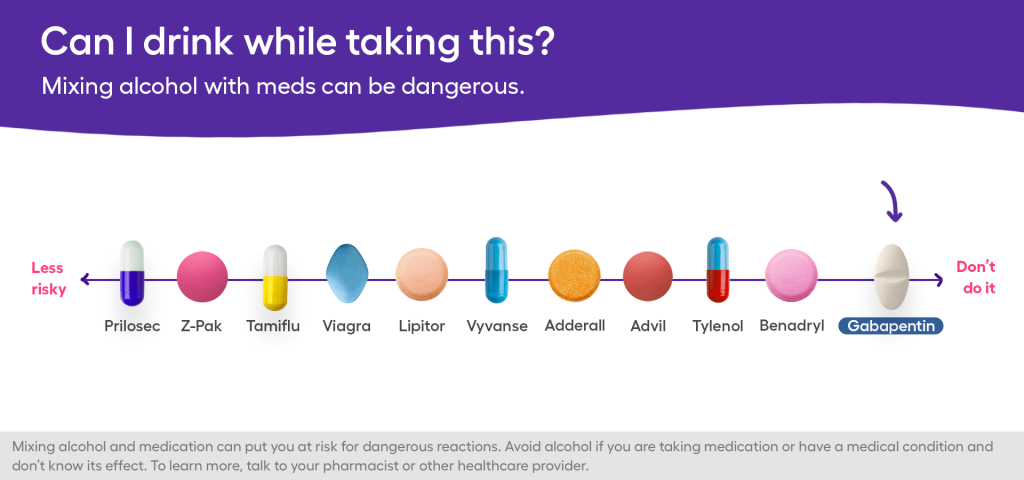Key takeaways
Mixing gabapentin and alcohol intensifies central nervous system depression, increasing risks of drowsiness, dizziness, and respiratory depression.
Consuming alcohol while on gabapentin can lead to severe side effects, including increased risk of seizures, overdose, and death.
Gabapentin is used in treating alcohol withdrawal syndrome but should not be mixed with alcohol due to the risk of adverse effects.
No anticonvulsants, including gabapentin and others like Lyrica, should be taken with alcohol, as this combination can lead to dangerous side effects.
Gabapentin (brand name Neurontin) is a popular prescription drug used to treat postherpetic neuralgia (nerve pain from shingles), seizures from epilepsy, or restless legs syndrome. So popular, in fact, that in 2004, gabapentin was prescribed more than 18 million times in the United States, and 2022, that number jumped to over 40 million times. It is sometimes prescribed off-label (for a non-FDA approved use) for mental health disorders like social anxiety disorder and severe panic disorder.
Known as a gamma-aminobutyric acid (GABA) analog, gabapentin is not currently classified as a controlled substance—though some states include it in their prescription monitoring programs. However, this prescription medication is involved in many substance use disorder cases, alone or in combination with opioids. One popular question that many patients ask is if gabapentin and alcohol are compatible.
Can you drink alcohol while taking gabapentin?
No. Gabapentin and alcohol do not mix. You should avoid the combination of alcohol and gabapentin at all times. Pfizer, the manufacturer of Neurontin (gabapentin), states, “Do not drink alcohol or take other medicines that make you sleepy or dizzy while taking Neurontin without first talking with your healthcare provider. Taking Neurontin with alcohol or drugs that cause sleepiness or dizziness may make your sleepiness or dizziness worse.”

What happens if you drink alcohol while on gabapentin?
Gabapentin and alcohol each individually cause central nervous system (CNS) depression and respiratory depression. Combining alcohol and gabapentin can worsen either or both effects.
CNS depressants slow brain activity and cause drowsiness and dizziness. Combining alcohol and gabapentin, two CNS depressants, can worsen these effects, making you feel extra drowsy and dizzy, causing impairment and accidents. There is also an increased risk of seizures with excess alcohol use or with alcohol withdrawal.
Respiratory depression occurs when you’re not getting enough oxygen. Your breathing can become slowed and shallow or even stop. In 2019, the FDA warned that gabapentin could increase respiratory depression risk when combined with risk factors such as:
- Older age
- Respiratory conditions such as COPD
- Use of medications (such as opioids) or substance use (such as alcohol) that depress the CNS
Alcohol consumption and gabapentin can intensify this effect and increase the risk of overdose and death.
How long after taking gabapentin can you drink alcohol?
Gabapentin has a half-life of approximately 5 to 7 hours, meaning it can take up to about 42 hours for the medication to clear from your system. In other words, you should wait about two days after taking your last dose of gabapentin to consume alcohol. Doing so will lessen the chance of increased drowsiness, dizziness, or impaired coordination, common side effects of gabapentin mixed with alcohol. Your best bet? Consult a healthcare professional for personalized medical advice before combining alcohol and gabapentin.
Are there any anticonvulsants (like gabapentin) that can be safely taken with alcohol?
If you’re taking gabapentin and looking to imbibe on the weekends, you may wonder if you can switch to another treatment option and safely drink. Unfortunately, the answer is no. The 2019 FDA warning about gabapentin also included Lyrica (pregabalin), another popular anticonvulsant. Other drugs used to control seizures also should not be mixed with alcohol, including:
- Tegretol (carbamazepine)
- Lamictal (lamotrigine)
- Topamax (topiramate)
- Trokendi XR (topiramate)
- Trileptal (oxcarbazepine)
- Keppra (levetiracetam)
- Depakote (divalproex sodium)
- Dilantin (phenytoin)
- Phenobarbital
- Benzodiazepines (such as Valium)
The same effects described above (CNS and respiratory depression) could potentially occur.
RELATED: How to avoid gabapentin side effects
Does gabapentin help with alcohol withdrawal syndrome?
Alcohol dependence is a common condition. Patients with alcohol use disorder are at risk of developing alcohol withdrawal syndrome if they abruptly stop drinking alcohol, which is why healthcare providers will prescribe a medication, like gabapentin or a benzodiazepine, and see the patient daily until alcohol withdrawal symptoms subside with the detoxification process.
Symptoms of alcohol withdrawal syndrome include agitation, tremors, nausea, sweating, vomiting, hallucinations, insomnia, rapid heart rate, increased blood pressure, and seizures.
Depending on the severity of their alcohol abuse, the patient may receive outpatient or inpatient treatment. Either way, the patient should receive ongoing treatment for alcohol dependence.
Because of the addictive nature of benzodiazepines, gabapentin may be preferred beyond acute alcohol withdrawal treatment. One small placebo-controlled study of 100 patients hospitalized for alcohol withdrawal syndrome (AWS) found that early treatment with high-dose gabapentin (1800 mg or more per day) was associated with a significant reduction in benzodiazepine treatment, faster alleviation of alcohol withdrawal symptoms, and a shorter hospital stay. The medication may also reduce cravings.
For the treatment of alcohol use disorder (AUD) and addiction treatment, the recommended protocol for gabapentin is typically 300 to 600 mg three times daily.
The bottom line
Mixing gabapentin and alcohol can pose significant risks, from heightened sedation and increased dizziness to impaired cognitive and motor functions—effects that can lead to dangerous events, especially when driving or operating machinery. What’s more, combining the two substances can worsen gabapentin side effects like confusion and respiratory depression, particularly in older adults or those with underlying health conditions.
To ensure safe treatment options and minimize potential risks, consult with your healthcare provider before consuming alcohol while on gabapentin. If you are fighting substance abuse or alcohol addiction, visit USA.gov for help finding a treatment program or contact the Substance Abuse and Mental Health Services Administration’s (SAMHSA) National Helpline at 1-800-662-HELP (4357).
- Number of gabapentin prescriptions in the U.S. from 2004 to 2022, Statista
- FDA In brief: FDA requires new warnings for gabapentinoids about risk of respiratory depression, U.S. Food & Drug Administration (2019)
- Neurontin prescribing label, AccessFDA
- FDA warns about serious breathing problems with seizure and nerve pain medicines gabapentin (Neurontin, Gralise, Horizant) and pregabalin (Lyrica, Lyrica CR), U.S. Food & Drug Administration (2019)
- High-dose gabapentin for the treatment of severe alcohol withdrawal syndrome: A retrospective cohort analysis, Pharmacotherapy (2019)
- Gabapentin: Recovery-focused treatment for alcohol use disorder, U.S. Department of Veteran Affairs




